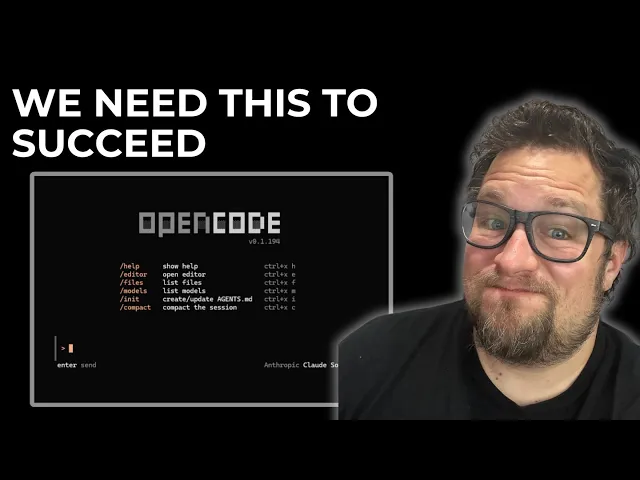We really need something like opencode to succeed!

OpenCode emerges as AI's GitHub moment
The line between artificial intelligence's capabilities and human coding skill continues to blur, with the recent introduction of OpenCode representing a potential watershed moment in software development. This open-source AI coding model from xAI aims to match or exceed the capabilities of proprietary alternatives while offering unprecedented accessibility and community involvement. As someone who's followed the AI coding assistant landscape closely, I'm convinced this development deserves your attention.
Key aspects that make OpenCode significant:
-
OpenCode represents one of the first truly powerful, fully open-source AI coding models that developers can freely access, modify, and deploy without restrictive licenses or prohibitive computing requirements.
-
By adopting a fully open approach, xAI has potentially unleashed a wave of community innovation that could accelerate OpenCode's capabilities beyond what any single company might achieve with a closed model.
-
The democratization of advanced AI coding tools could fundamentally reshape software development practices, allowing smaller teams and individual developers to accomplish work that previously required much larger engineering departments.
The most compelling aspect of OpenCode isn't just what it can do today, but what it represents for the future of software development. While GitHub Copilot, Amazon CodeWhisperer, and other proprietary tools have demonstrated AI's potential to transform coding, their closed nature inherently limits both their adoption and evolution. OpenCode's open-source foundation changes this dynamic entirely.
This shift mirrors what we've seen throughout computing history: proprietary systems often pioneer new capabilities, but open platforms typically drive widespread innovation and adoption. Consider how Linux transformed server computing or how Android became the dominant mobile platform globally. Open systems tend to win in the long run because they harness collective intelligence and create broader economic opportunities.
What the video doesn't fully explore is how OpenCode might reshape programming education and workforce development. Traditional coding bootcamps and computer science programs have struggled to keep pace with industry demands. With sophisticated AI coding assistants becoming widely accessible, educational institutions will need to fundamentally rethink their approach. Rather than focusing primarily on syntax and basic programming concepts, education will likely shift toward teaching students how to effectively prompt, direct, and collaborate with AI coding systems.
This represents both a challenge and an opportunity. On one hand, it may lower barriers to entry for programming careers, potentially bringing greater diversity to the field. On the other hand, it raises questions about
Recent Videos
How To Earn MONEY With Images (No Bullsh*t)
Smart earnings from your image collection In today's digital economy, passive income streams have become increasingly accessible to creators with various skill sets. A recent YouTube video cuts through the hype to explore legitimate ways photographers, designers, and even casual smartphone users can monetize their image collections. The strategies outlined don't rely on unrealistic promises or complicated schemes—instead, they focus on established marketplaces with proven revenue potential for image creators. Key Points Stock photography platforms like Shutterstock, Adobe Stock, and Getty Images remain viable income sources when you understand their specific requirements and optimize your submissions accordingly. Specialized marketplaces focusing...
Oct 3, 2025New SHAPE SHIFTING AI Robot Is Freaking People Out
Liquid robots will change everything In the quiet labs of Carnegie Mellon University, scientists have created something that feels plucked from science fiction—a magnetic slime robot that can transform between liquid and solid states, slipping through tight spaces before reassembling on the other side. This technology, showcased in a recent YouTube video, represents a significant leap beyond traditional robotics into a realm where machines mimic not just animal movements, but their fundamental physical properties. While the internet might be buzzing with dystopian concerns about "shape-shifting terminators," the reality offers far more promising applications that could revolutionize medicine, rescue operations, and...
Oct 3, 2025How To Do Homeless AI Tiktok Trend (Tiktok Homeless AI Tutorial)
AI homeless trend raises ethical concerns In an era where social media trends evolve faster than we can comprehend them, TikTok's "homeless AI" trend has sparked both creative engagement and serious ethical questions. The trend, which involves using AI to transform ordinary photos into images depicting homelessness, has rapidly gained traction across the platform, with creators eagerly jumping on board to showcase their digital transformations. While the technical process is relatively straightforward, the implications of digitally "becoming homeless" for entertainment deserve careful consideration. The video tutorial provides a step-by-step guide on creating these AI-generated images, explaining how users can transform...
